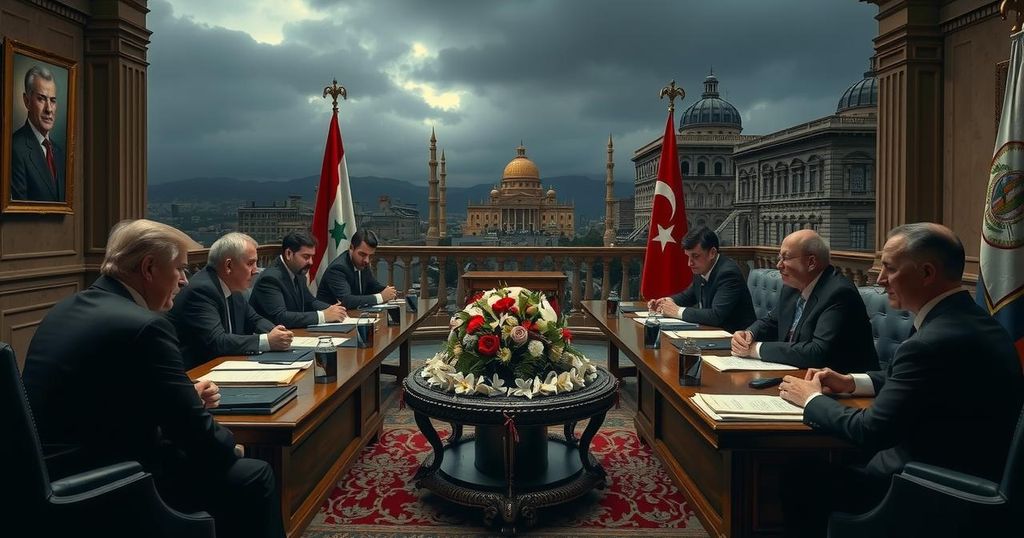World news
ABU DHABI, ARAGHCHI, ASIA, BASHA, CONFLICT, DAMASCUS, EMIRATI, HAYAT TAHRIR AL - SHAM, HEZBOLLAH, HTS, IRAN, IRANIAN REVOLUTIONARY GUARDS, IRNA, ISRAEL, MIDDLE EAST, MOHAMED BIN ZAYED AL - NAHYAN, REVOLUTIONARY GUARDS, SYRIA, SYRIAN CIVIL WAR, SYRIAN CONFLICT, TEHRAN, UNITED ARAB EMIRATES, WAR
Elena Martinez
0 Comments
Iran Supports Syria Amidst Insurgent Offensive Following Aleppo Capture
Iranian Foreign Minister Abbas Araghchi is visiting Damascus to extend support to President Bashar al-Assad as Islamist insurgents, notably HTS, capture Aleppo. This visit comes amidst heightened tensions and reassessments among regional partners following these territorial losses, with Assad reaffirming his government’s strength during ongoing military confrontations with rebel forces.
In a bid to reaffirm support for Syria amid escalating conflict, Iranian Foreign Minister Abbas Araghchi is set to visit Damascus following the recent advances of Islamist insurgents capturing Aleppo, Syria’s second-largest city. During his anticipated visit, expected on Sunday, Araghchi will communicate Tehran’s strong backing for President Bashar al-Assad’s regime as it confronts significant military challenges. This development comes as various stakeholders, including Damascus’s allies, reassess their positions in light of Assad’s territorial losses in northern Syria, particularly following the rapid takeover by Hayat Tahrir al-Sham (HTS).
Assad, who had maintained a low profile during the insurgent offensives, re-emerged to connect with regional allies, highlighting the Syrian government’s capability to deter the insurgency with foreign support. Historically reliant on assistance from Iran and Russia, the regime has experienced fluctuations in military control, evident from Assad’s recent strategies, including the extensive use of force against opposition factions.
The loss of Aleppo has raised alarms among Assad’s supporters, prompting urgent communications between Iranian and Russian officials. They expressed concern over the unfolding situation, attributing some of the unrest to influences from the United States and Israel. In contrast, a U.S. official denied any American involvement in the turmoil, emphasizing that HTS is recognized as a terrorist group.
As Turkish-backed rebels and Kurdish forces swiftly seize the territory vacated by Assad’s forces, military countermeasures are being deployed. The Syrian Defense Ministry has announced an effort to fortify defenses in northern Hama, aiming to repel militant advances. Simultaneously, further airstrikes from affiliated forces have targeted opposition-held regions, intensifying the ongoing conflict as civilian casualties continue to mount.
The Syrian civil war, which began in 2011 as a series of protests against President Bashar al-Assad, has evolved into a complex conflict involving multiple factions and foreign powers. After Assad’s forces initially lost control of several regions, they regained territory with the powerful support of Russia and Iran, utilizing intensive military tactics including airstrikes and ground deployments. However, recent territorial losses, notably the capture of Aleppo by HTS, signify a potential shift in the military landscape in Syria, requiring a reassessment of alliances and military strategies by Assad’s government and its supporters.
The visit of Iran’s top diplomat to Damascus highlights Tehran’s commitment to supporting the Assad regime during a precarious moment as Islamist militants gain ground in northern Syria. The ongoing conflict illustrates the complexity of the Syrian civil war, underscoring the significance of foreign alliances and the potential for changing dynamics on the ground. Resistance efforts and subsequent military developments will determine the future control and stability of the region in the wake of these recent upheavals.
Original Source: www.theguardian.com




Post Comment